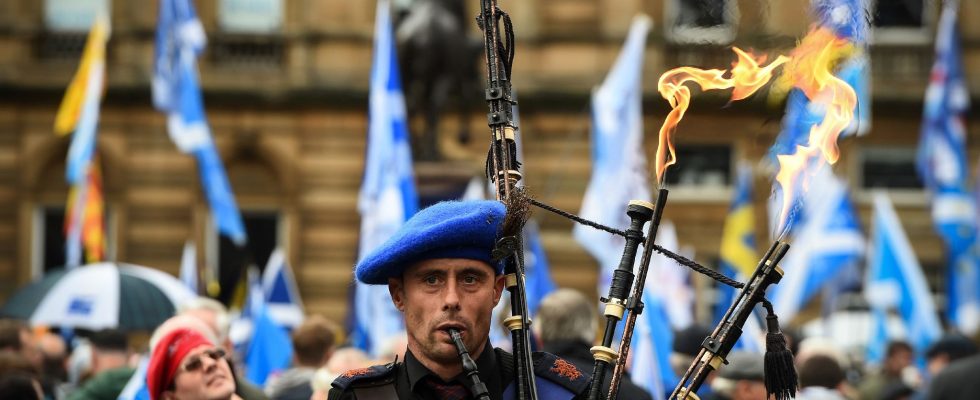“Time comes to the end of all governments, even those which have not had the chance to be led by a Boris Johnson or a Liz Truss”, quips journalist Alex Massie, a keen observer of English and Scottish political life. , from Edinburgh. This wear, the Scottish nationalists in power since 2007 pretend to ignore it. However, everything announces their approaching fall, already preceded by the sharp decline of independence sentiment in public opinion. In other words, and as soberly summarized by the daily The Times, “In Scotland, it’s the end of an era”.
Beyond the natural erosion, the Scottish National Party (SNP) has accumulated scandals and difficulties since the beginning of the year. In February, the announcement of his resignation was surprising: why did Nicola Sturgeon decide to leave power before the end of her mandate? The Scottish Prime Minister spoke of the nervous fatigue after 8 years at the head of the party and the region, and the conviction that she had to pass the torch to a new generation. Either. Disciplined, the members of the party followed his recommendations, and his successor, Humza Yousaf, thirty-something of Pakistani origin, was elected at the end of March. Alas, the arrival of new blood at the head of Scotland was soon to be eclipsed by the custody of Nicola Sturgeon’s husband, Peter Murrell, then director general of the SNP, questioned at length about “abuse of corporate assets “within the party.
Investigation of the Scottish Police, baptized “Operation Branchform” and started two years earlier, had just taken on a new dimension. In his viewfinder, suspicions of “illegal party financing”, “embezzlement” and “illegal taking of interests”. From there to conclude that Nicola Sturgeon preferred to resign before the police knocked on her door, there is only one step that many find easy to cross. A month after her husband, it was she who was taken into custody on June 11. His seven hours of interrogation caused a political upheaval from Edinburgh to Glasgow. “There was a before and an after”, summarizes John Curtice, renowned political scientist and professor of political science at the University of Strathclyde. “The arrest of her husband had little effect on the Scottish electorate. On the other hand, hers completely undermined the confidence of the independence voters, in her and in her party.” Will the police, who are about to make public the conclusions of their investigation, put Sturgeon and her husband on trial? Some within the SNP fear it. In the meantime, it remains unclear what happened to the £660,000 (nearly €730,000) that had been raised in the event of a second independence referendum and how it was spent. As for the cost of the investigation for the taxpayers, 800,000 pounds, it gives food for thought to the Scottish Labor opposition whose new leader, the forty-something Anas Sarwar, also of Pakistani origin, is seeing its wings grow.
The SNP must face headwinds: the renewed vitality of Scottish Labor carried by the very probable victory of Labor in the next general election in Great Britain, and the low popularity of Nicola Sturgeon’s successor.
These signs that do not deceive
A sympathetic but uncharismatic man, having failed to shine as Scottish Minister of Health, Humza Yousaf had campaigned for the leadership of the SNP with a message of disconcerting frankness. We could sum it up like this: “Like Nicola Sturgeon, but less well.” Five months after his election as head of the party and of Scotland, he enjoys no goodwill from the Scots. They are only 23% to say they are satisfied with their Prime Minister.
More worrying for his training, the polls on a second referendum now show that a majority of Scots are opposed to it. The latest study by the YouGov institute reveals that 46% of respondents would vote against Scottish independence, 37% for. However, despite all this, Humza Yousaf and the SNP continue to hammer home their separatist credo, even using it to avoid tackling the burning issues deemed priorities by public opinion: the local economy, the ruined health service, the fight against drugs, the construction of roads in the Highlands and the modernization of public transport. “Scottish nationalists continue to proclaim that only independence can solve everything, and that the real people responsible for Scotland’s problems are in London. This is their flagship argument, a kind of universal solvent, points out Alex Massie, but it is a cache-miserie and the sign of the intellectual impoverishment of the party because the reality is obviously much more complex.
There are unmistakable signs. For the past few months, SNP MPs in the House of Commons have been announcing one after another that they will not stand for re-election next year. They are already 8 out of the 45, and not the least, in particular Ian Blackford, former leader of the party in Westminster. No doubt they have read the polls: these predict that the Labor Party of Keir Starmer and Anas Sarwar will win more than half of the seats currently held by the SNP next year.
Carried by the wind of democratic alternation which blows as much in England as in Scotland, Keir Starmer has also started a charm offensive with the Scottish electorate. It was in Edinburgh that he recently presented his environmental manifesto. This is to reassure the local oil industry which employs 90,000 people in Scotland and to promise that the ecological transition will not create unemployment but will, on the contrary, create new jobs. A weighty argument. “It is not so much failure that awaits Humza Yousaf and the SNP as indifference, judge Alex Massie, and it is much worse.” As if Scottish nationalism were no longer relevant in illuminating the future.
